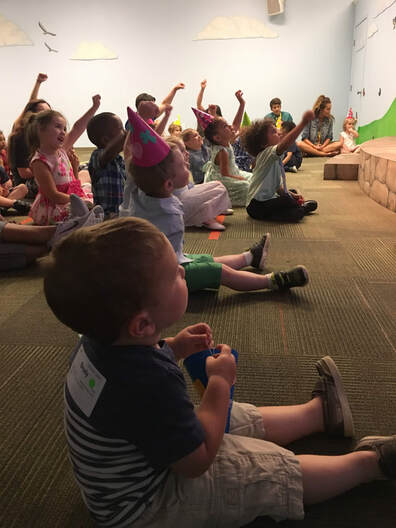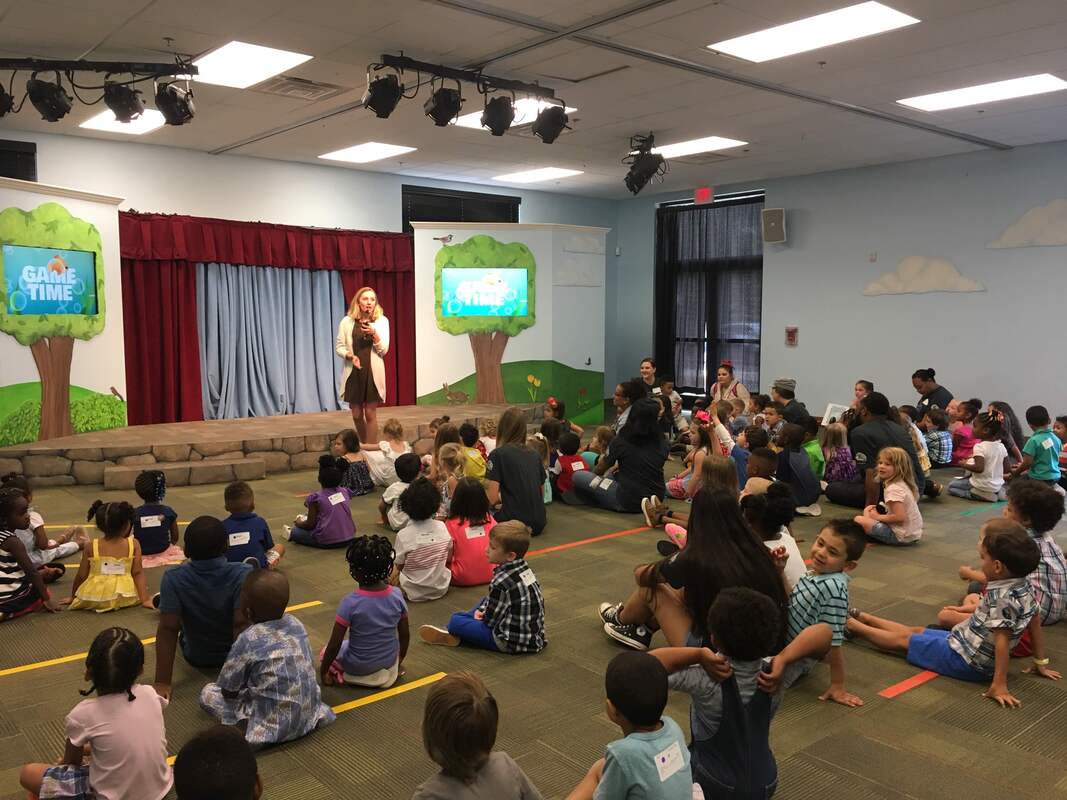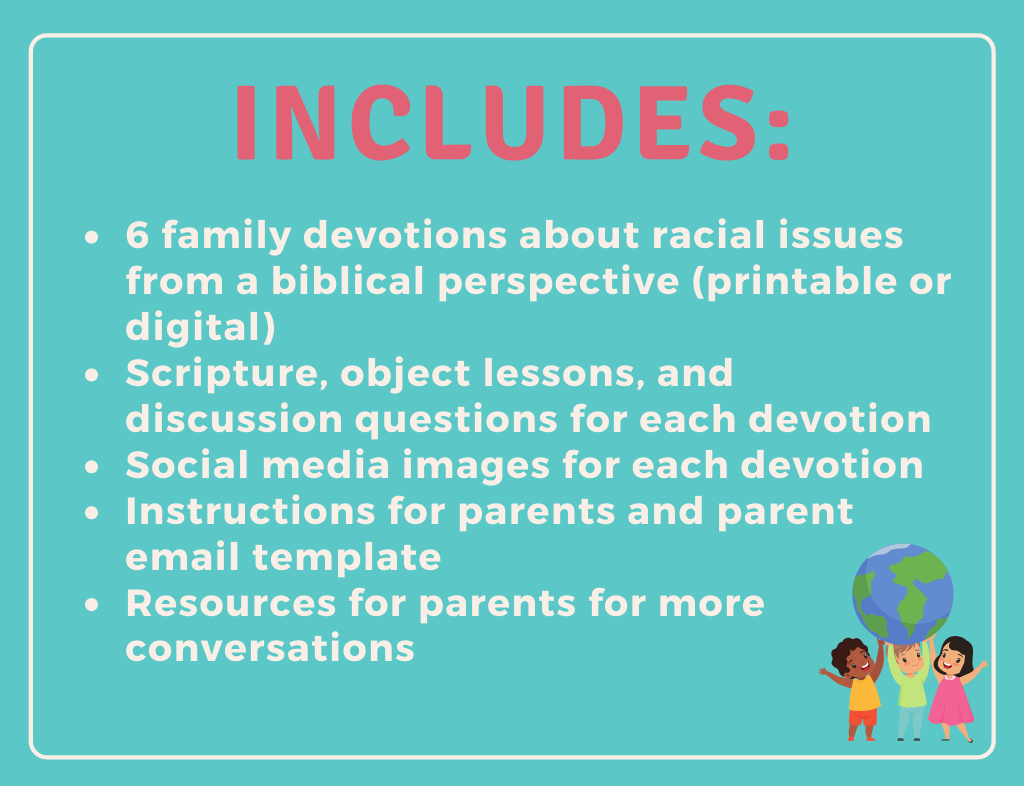|
Download this free resource: Bible verse valentines that you can print and give to kids or volunteers this Valentine's season to help point them to the true love of God. You can print and cut them apart and give as-is or attach to candies or treats.
1 Comment
After a children's ministry service that was filled with emotion and the feeling of the presence of God, I had just finished a large group prayer time in which two kids gave their lives to Jesus, and I dutifully filled out the "Response Card" and met the parents of the kids after the service to tell them, "Your child accepted Jesus today!" One parent looked confused and said, "... Thanks ... My son has already done that. But good to know he did it again today." The other parent looked a mixture of joyful and disappointed. "That is wonderful ... I only wish I could have experienced this with her and prayed with her. It's something we've been talking about." After that day, I started reevaluating how I did "altar calls" in children's ministry. When I say "altar calls," I am referring to a large-group salvation invitation during a children's ministry service. I don't believe this is always the best way to lead kids in their faith journey. Before you cancel me and ban me from the children's ministry community, let me explain.
Here's what I'm NOT saying:
As a children's pastor, I used to help facilitate emotion-filled experiences in which kids may have felt pressured (whether by their peers, their leaders, or the environment) to raise their hands or come forward, whether or not they understood what they were doing. I did not grow up in the church, and once attended a church camp with a friend when I was about 8-9 years old. I had no knowledge of the Bible or the gospel, but when they asked who wanted to raise their hand and get saved, I thought, "Sure! Why not?! Sounds great to me!" So I raised my hand. I remember that I had no clue what was happening, then they told my parents, "She's been saved!" I never went to church or read a Bible or did anything to do with God or Jesus after that. There was no follow-up. There was no real heart change, discipleship, or understanding at all. I just didn't want to be the only one not raising my hand. Years later, as a teenager under the mentorship and discipleship of a youth pastor and his wife, I spent months diving into the Bible and asking questions and feeling the nudge of the Holy Spirit as I began to understand the gospel. I gave my life to Jesus at the age of 16, and I was in a church, surrounded by community and spiritual mentors, accountability, and discipleship opportunities. While I don't think it harms kids to make a decision for Christ without fully understanding it or receiving follow-up and discipleship, it doesn't nurture their faith journey and provide opportunities for true faith formation. Here's why I stopped doing large-group altar calls ...
So if not in large-group altar calls, how do we present opportunities for kids to know Jesus as their Savior and grow in their faith? We can make the Bible the center of everything we teach, and show kids how it's all connected to God's big story. As we teach Bible stories each week, we can show kids how the stories connect to God's big story and show them their place in God's big story: that they are created by God, loved by God, known by God, loved by Jesus, and that they can be forgiven and saved when they trust Him as their Savior. When that happens, they are redeemed and made new through the Holy Spirit and are adopted into the family of God. We can communicate those truths to kids over and over, and give them continued opportunities to respond to God within that context. We can remind them that their faith is journey of knowing God and becoming more and more like Jesus. . We can provide opportunities for them to worship, pray, experience God's presence, and grow in their faith. We can equip and partner with parents to lead and disciple their kids. We can always be ready to talk with kids, answer their questions, lead them, and point them to the only One who can truly change them: Jesus. So in those times I presented a large group salvation call in children's ministry and joyfully reported to my pastor that "13 kids got saved today!" Do I think it was ineffective, or not real? I don't know. I don't know how many of those kids understood and received follow-up and discipleship. I don't know if their parents are leading and nurturing their faith at home. God could have planted a seed in their hearts in that time that would get watered later down the road in their lives. Do I think it's bad or harmful for those who DO present large-group altar calls? Not necessarily. But I think with some reevaluation, intentionality, and purpose, God can use children's ministry to help grow faith in kids that is powerful and truly life-changing! As I walked into a church for the first time with my young kids recently, within the first two minutes of walking into the church, we were approached by four older men (who I assume were greeters) who persistently got in their personal space and touched them (or tried to touch them), even when my kids made it clear they didn't want to be touched. One put his hands all over their faces and another told my four year old daughter she's pretty and keep asking for a hug, even though she backed away and didn't want to give a hug. Another made my kids shake his hands and (playfully) wouldn’t let go. I firmly (and also politely) stepped in front of my kids and said, “No thanks” and kept my kids close to me. At another church we visited, one of the outside greeters got in my daughter's face and continually told her she's pretty and asked lots of questions while within half and inch from her face, and touched her head, even though my daughter backed away. The woman was so persistent that she followed us as we walked to the parking lot, while still in my daughter's face.
I assume all these greeters were pure and innocent with good intentions of simply being friendly, but as a parent, it's my job to protect my kids, and not all people are pure. It's important for kids to know they are the boss of their bodies, and they don't have to let someone get too close or touch if they don't want them to. Kids need to have healthy boundaries, and it's just as important for adults to respect their boundaries. Don't neglect to train your greeters (and all volunteers) about respecting kids' personal space and boundaries. These are a few reasons this is important:
So how can you train your volunteers to respect kids' personal space and boundaries? These five things are important to keep in mind: 1. Teach volunteers and greeters that all physical contact with kids should be initiated by kids. I know as a children's ministry leader, we like kids (hopefully!). It can be easy to overlook physical boundaries with kids we know and love, but it's important for all physical contact between kids and grownups to be initiated by the kids. If a volunteer does offer a physical greeting, the adult should ask permission first and respect the child's answer. No response should be treated as a "No." 2. Create safe-touch policies and train all volunteers in appropriate vs. inappropriate touch. If you don't already have a church policy about appropriate and inappropriate touch, create one and put it in writing. Teach it to your volunteers. If you don't have one, a good place to start is: APPROPRIATE
Do not assume your volunteers know all of these are inappropriate. Some of the actions listed are often innocent forms of showing affection that many of us wouldn't think twice about, but it's important to have clear and firm policies that apply to all volunteers and all kids, even kids you know well. 3. Be aware of how volunteers are interacting with kids, and be willing to have tough conversations when needed. Watch and listen in your classrooms, hallways, lobbies, entryways, and even your parking lot. If a volunteer is violating any of the policies or making kids feel uncomfortable in any way, be willing to pull the volunteer aside for a conversation. In the conversation, let the person know you assume the best and trust the purity of the person's intentions and heart. Show appreciation for the person's willingness to serve and friendliness. But don't beat around the bush or be vague about what you're saying. Be firm and clear. Tell the volunteer exactly what he or she is doing that isn't right, and give them the important information about why it's not okay. If the volunteer isn't willing to make changes, be prepared to remove the person as a volunteer or put the person in another role that doesn't involve interaction with kids. 4. Keep in mind that sometimes, it may happen with people who are not children's ministry volunteers, or even official church volunteers at all. Be aware that sometimes the extra-friendly people in your church may not be those who are on your children's ministry volunteer team and may not have heard your policies. Keep your eyes and ears out for people who may be greeters at the main church area, the parking lot, or even someone who isn't a volunteer in any official way. It may be a well-intentioned person who simply enjoys kids and isn't aware of personal boundaries Also, we aware that people from older generations or other cultures may be more likely to show more physical affection or have different physical boundaries. 5. The safety and needs of the kids is the number one priority. It can be tempting to ignore or write off someone who you know and trust the person's well-meaning intentions (especially older people), but the safety and comfort of parents and kids is more important than wanting to spare someone's feelings. Will it hurt a person's feelings if you approach them and with correcting or admonition? Maybe. But with love and grace, the volunteer has the opportunity to grow and learn, which is something we can all hope for! All of these things are a valuable way you can protect kids and volunteers in your church. Showing affection is a natural part of working with kids, and sometimes this can even go the other way, with kids who may not be aware of personal space and boundaries! I've had times where I've had to peel kids off of me when they've gotten very attached. Make sure your volunteers know it's okay to be firm and have boundaries with kids who are very physically affectionate. Showing appropriate and wanted affection and genuine hospitality as we welcome kids into our ministries is a very important way to love the kids in our church, but it must be done with sensitivity and intentionality to help ensure all kids are secure and comfortable. Feel free to share this post with your volunteers and church leaders and take this issue seriously. It could make the difference for kids and families staying at your church and hearing the gospel. One of the biggest and easiest mistakes to make when recruiting children's ministry volunteers is making their job too "easy" and small. Children's ministry leaders who are desperate for volunteers, apologize for asking people to volunteer, then tell them, "You don't have to do much; just show up and stand there for a little bit until parents come," or "Just watch these kids once every six weeks and let them play."
By downplaying the role and making it too easy and too low-commitment, you make it unimportant and unappealing. People don't want to be a part of something small and easy; they want to be a part of something life-changing and something that matters. And as a children's ministry leader, you don't want just a warm body to stand in a room; you want committed, passionate people who are serving using their gifts with excellence. When we make their jobs easy and small, people will feel insignificant and will burn out, and will be much more likely to call off or quit the team. Instead, when you recruit volunteers, ask big. Invite them to a life-changing mission and empower them to lead and serve using their gifts. Raise the bar on the expectations of the ministry and give them important and significant jobs and value in the ministry. People want to be a part of a team that is making a difference. When you recruit volunteers, make sure they're serving in a role they're passionate about and can use their gifts. When you do this, your children's ministry teams will transform and you'll have a team of leaders who are committed, passionate, excited to be there and serve with excellence. This doesn't mean you need to make it too time-consuming or to expect too much from your team, but I've found that when I empower volunteers and have good leadership and communication, good curriculum and resources available, and a structure for them to serve, they're excited to serve, and they go above and beyond. Isn't that what every children's ministry leader dreams about? It was a few years ago, when I was working at a large church, on a busy Sunday morning, with many new families visiting the church every Sunday. Part of my job was helping the new families find the right classroom, and that includes asking their age (since our preschool rooms were age-based). I asked an innocent question and made an innocent (and common) comment.
I asked the mom, "How old is she?" The mother said her daughter (who was very tall!) was four, and I commented cheerfully, "Oh, well you're a big girl! Here's your classroom!" and the mother LOST IT. She flipped out in the middle of the hallway, in front of her daughter and other families. She started yelling about how "...my daughter is perfect! She's not too tall! She's wonderful JUST how God made her! She hears everywhere we go that she's too big for her age, and she's JUST RIGHT! Don't you say she's a big girl!" I stood there, dumbfounded, unsure of what to even say, except for mumbling something like "I'm so sorry... you're right, she's perfect...." It may have crossed my mind during that scenario that the mother overreacted, and maybe she did. But it's not my place to judge, because I don't know what that mother and daughter had been through in their lives. I don't know what their weekend or morning had been like before church, or what kind of bullying or struggles the daughter may have experienced. I do know as a parent that I am fiercely protective over my kids, even to the point of responding irrationally when I feel they might be threatened. I've been the overreacting parent before. Parents protect their kids. So if a parent does overreact, we give them grace. As children's ministry leaders, it's our job to keep our cool even when others don't. When parents or kids react in loud ways, it's our job to remain collected, and respond with grace and kindness. I learned that it's not ever our place as children's ministry leaders to comment on a child's appearance. Even innocent observations or comments about a child's appearance aren't necessary or helpful, and may bring up feelings, memories or experiences with negative connotations, or may be misconstrued. Some things NOT to say to OR about a child:
It can be tempting, especially when you're not sure what else to say, to comment on a child's appearance. And many times, we are all guilty of saying these things. Most of the time, they are taken well, but we must remember: you don't always know what a family or child has been through or what a child is feeling, or what they've been told. And we know that while man looks at the outward appearance, the Lord looks at the heart (1 Samuel 16:7). It's important to focus on a child's heart. Encourage their effort, their character, their hearts, their faith; instead of their appearance. Things TO Ask or Say to a Child:
Speak God's truth and His Word over the kids in your ministry any chance you get. You might be the only one to tell them God has great plans for them. Your encouragement might breathe life into their soul and inspire them. When you have an opportunity to speak to the heart of a child, even if only for one minute, don't waste it. Speak words of life and truth over them. Our words are powerful, and they can make a difference in the lives of kids. I learned that lesson the hard way after that experience with the mother in the hallway. And I wish I could say I've never commented on a child's appearance again, but I do catch myself. We all (myself included!) need a keen awareness of the importance of our words to kids. This quote is from one of my favorite books, Just a Minute by Wess Stafford: "If God stands a child before you, even for just a minute, it is a divine appointment. You have the chance to launch a life. You never know when you are making a memory. With each child you encounter, you have the power and opportunity to build up . . . or, sadly, to tear down. A life can literally be launched with as little as a single word . . ." *Disclaimer: Keep in mind, there may be instances in which you need to ask a child's age or medical needs, or ask if they are sick (if they are showing symptoms of illness), or assess if signs of abuse are present. This post isn't about those situations, which must be handled with tact and wisdom. Talking to your kids about racial issues doesn’t have to be daunting, even if you’re nervous or you’re still learning yourself. Opening up the Bible and having authentic conversations with your kids can make a difference for opening their hearts to God’s truth. You can start having age appropriate conversations with your kids at any age.
If your kids have questions, answer them the best way you can, but also know it’s ok to say “I don’t know,” or “Let’s figure it out,” if you don’t know how to answer a question. Also remember that talking is the first step to helping your kids understand racial justice and be a part of change; encourage your kids to live it out and to fight for racial equality, to stand up against injustice, and to love others the way God loves them. The truth is that diversity is glorious. Heaven will be filled with people worshiping together – and the people will all look different, and it will be beautiful. The world we live in is fallen and filled with sin. As much as it hurts us, it hurts God more. In this dark and hurting world, we can raise kids who are a light for Christ and an example of His love. The good news in a world full of sadness is the Gospel wins, and the Gospel transforms us. The most important thing you can teach your kids is that God loves them and wants a relationship with them, and you can’t say that too often. If your kids don’t have a relationship with Jesus, that is the starting point. Loving others with the love of Jesus and seeing them through God’s eyes starts with a relationship with Him. When we know God, we will see others through His eyes. The Gospel must inform and transform our understanding of equality and race. Where there are people who are hurting, the Gospel must bring healing and hope. Where there is division, the Gospel must bring unity and peace. Where there is injustice, the Gospel must bring justice and reconciliation. Where there are people who have been oppressed and judged, the Gospel must bring hope, grace, and freedom. The Gospel is powerful, and our families and our world need the Gospel more than anything. To help families have conversations, here is a devotional I created that is based on six biblical truths that inform our views on race, equality and justice. These six devotions will allow you the opportunity to talk to your kids about racial issues from a biblical perspective. Each devotional includes Scripture, discussion questions, and an easy object lesson you can do from home with your kids using supplies you probably already have at home. Asking questions and listening can be helpful ways for us all to learn, so model that for your kids during the devotional time. Object lessons promote hands-on learning, which can help the truths stick for kids. You can end each devotional time with prayer and worship if you want. You can do one devotion a week for six weeks, or one a day for six days, or any way you want. Don’t let the conversations stop after these devotions are done. Keep talking with your kids, praying with them, and fighting for them and for truth and justice. There are additional resources linked at the end of the resource to have further conversations about the topic. There's a joke about children's ministry leaders that when church members see them walking toward them in church, they run and hide so they don't get asked to volunteer. It's funny, because many times, it's true. And many children's ministry leaders dread that "ask" even more than the people running to hide. Many children's ministry leaders are trying to do all the ministry themselves, desperate for volunteers, and then end up apologetically begging people to step in and "just do this." But here's the problem: people don't want to just do a small task. They want to be a part of a team; they want to do something important and life-changing. How do we go from struggling to have enough volunteers to having a waiting list of people because so many want to serve?
Yes, you could do a ministry fair, a recruiting campaign, a bulletin announcement, a pulpit announcement, or you could even require parents to serve, but you might not end up with passionate, energized, committed volunteers doing those things. Or you could . . . 1. Invite them to a big vision. Instead of asking someone to come to the nursery to change diapers, invite them to come change lives. Cast the vision for the importance and eternal value of children's ministry, and invite people to be a part of that vision. Don't give them small jobs or make it seem as simple and insignificant as possible. Raise the bar for serving and give them leadership and ownership in the ministry. People want to be a part of something significant and life-changing. Ask people one-on-one, rather than just blanket announcements. 2. Create an irresistible volunteer environment. When you have a culture of celebration, fun, excitement, and life-transformation, people will want to be a part of it. Share wins. Keep a high standard of excellence in your ministry, in the way you care for and celebrate your volunteers, the way you communicate, the community you create, and excellence in the details of the children's ministry programming. If your environment is irresistible, people will be excited to be a part of it! 3. Develop teams and care structures. Care for the volunteers you currently have. People don't want to serve as lone rangers, they want community and a team to belong to. Develop a team for every volunteer area, and a designated team leader to care for and invest in those leaders. When your current volunteers feel valued and well-cared for, they'll stick around, and also want to invite their friends to be a part of the team as well. 4. Know who you're looking for. Write job descriptions for every role you want to fill. You can't fill roles if you don't what you're looking for. Look for people with the gifts, experiences, and passions to fit those roles. Don't put people where you need them; put them where they will thrive and be passionate to serve. Look for leaders and people with the spiritual gifts you need, then give them an opportunity to use their gifts. Develop and invest in people to help them grow in their leadership and spiritual gifts. 5. Equip your current volunteers. Give your current volunteers ownership and responsibility for recruiting and for real leadership in the ministry. Don't just delegate tasks, give people opportunities for leadership and ministry. When the current volunteers are bought in to the vision and the ministry, they'll invite others to be a part of it too. 6. Host a regular new volunteer orientation. Hosting a regular (monthly would be awesome) event to share your vision with potential volunteers will give people who are interested a concrete event to attend. Use it as a time to introduce them to your ministry, your vision, and the opportunities for them to use their gifts on your team. Follow-up with everyone who shows interest in serving within 48 hours. 7. Be present and think outside the box. Show up to church events that don't involve your ministry. Make sure you're in the main worship service regularly. Show your face around the church and get to know people in as many ways as you can. Being present allows you the opportunity to see people's spiritual gifts and passions, and share your vision and wins from children's ministry. Also, think outside the box when you're looking at potential volunteers. Many children's ministry leaders go to the obvious choice for the volunteer pool: parents of kids in the ministry. But you could also look at teens, college students, young single adults, young married couples without kids, parents of teens, empty-nesters, grandparents, widows. Create intentional diversity in your volunteer teams. Invite people from all walks of life to serve, and you might be surprised by some who become your best volunteers! My volunteer bundle includes everything you need to recruit and assimilate children's ministry volunteers. It includes volunteer job descriptions, interest flyers, volunteer orientation overview, volunteer handbook, volunteer applications, volunteer interview questions, and more! And it's all editable. I remember being a new children's pastor and running around like a chicken with my head cut off on Sunday mornings, trying to do it all myself. I dreaded Sunday mornings, knowing we would always be short-handed, and dreaded even more having to ask people to serve. I would apologize and ask them to just stand there and not do very much. But after God changed my views and gave me a fresh vision for recruiting volunteers, I saw the volunteer teams I was leading grow and flourish. A team I led that started with 30 volunteers grew to over 150 volunteers, with some areas overstaffed, because so many people wanted to serve. God gave me a passion for developing teams, investing in leaders and helping them grow, and giving away the work of the ministry to others. You could go from struggling to having a waiting list of people lining up to serve in your children's ministry! When's the last time something stressful happened on a Sunday morning in your children's ministry? You don't have to be in children's ministry very long to discover things can go wrong quickly on a Sunday morning. No matter how well prepared you are, things beyond your control can happen. Some Sundays, everything seems to go wrong at once! The check-in system fails, the worship music is wrong, the props are missing, volunteers call off at the last minute, a parent is upset. I've had my share of Sunday mornings where I wanted to either run and hide, cry, or yell in frustration. Stressful and unexpected things will always happen, but the best children's ministry leaders are those who can remain calm, unflappable, and confident even in the midst of stressful situations. When a child vomits on the stage, a volunteer doesn't show up, or an emergency occurs, an outdoor event gets rained out, the technology completely fails you - how you respond during those times will make you stronger and strengthen your influence or break you down as a leader.
l'll be the first to admit I've had many times where I did not handle my stress well, where I got flustered, frazzled, or frustrated, and everyone knew it. A good leader can learn and grow from their weaknesses. Being a leader who is unflappable, calm, and positive during stressful Sunday mornings is something that comes naturally to some, but to others (like me!), it's a skill to intentionally practice until it becomes second nature. Here are some things I've learned about how to deal with stressful Sunday mornings. 1. Pray first. Before you ever get to church, pray over the service, the kids, the parents, the volunteers, even the technology! Cover the ministry with God's power and anointing. Stay connected to God throughout the day. If anything goes wrong, you'll handle it with more grace, strength, and confidence when you're connected with God. 2. Rest and eat. For some people, this may not be a trigger, but for myself, I am much more prone to handling stress poorly on days when I'm tired or hungry. If I show up to church on Sunday morning running on 3 hours of sleep and no breakfast, I'm going to be easily irritable and stressed out. I'm more likely to break down emotionally or lash out at others. Be aware of your own triggers, and take care of yourself before you arrive at church. 3. Be prepared. You can't prepare for every single scenario that could possibly happen on a Sunday morning, but the more prepared you are, the better your Sundays will go. Get as much done as possible ahead of time, and schedule extra time for troubleshooting. Have a backup plan for things that could commonly fail. Prepare a backup check-in system, a back-up children's ministry lesson that doesn't involve technology or props, a backup system for volunteers who don't show up, a backup idea for any activity that's dependent on weather. 4. Make decisions with confidence. When you make a last-minute change or decision about something, speak with confidence and positivity. Even if you're nervous, when you speak with confidence and give people a plan, people will trust and follow you. 5. Don't complain or vent. Even if nothing is going right, resist the urge to let everyone know about it. Don't tell all the parents the volunteers are late. Don't tell all the volunteers the technology is demon-possessed. Don't broadcast to the entire staff about an upset parent. When something stressful happens or goes wrong, make it your goal (as much as possible) to make sure nobody can tell. This doesn't mean you have to be fake, you can let others know you're struggling, but it's not ok to vent or complain to parents, kids, or volunteers on Sunday mornings. 6. Take a break. If you can, take a moment to step away and collect yourself. Get alone. Take a deep breath. If you can't get alone; pause. If something catches you off guard or someone approaches you angrily, take a moment to pause before you respond or speak. 7. Smile. Studies show that even when you don't feel happy or confident, there's something about smiling anyway that makes your emotions follow your body. You can literally make yourself happier just by forcing a smile. It might feel like you're being "fake" by smiling when you don't feel like it, but you're actually tricking your body into actually feeling it. Try it next time you're stressed. 8. Focus on the big picture. Remind yourself of the positives and the reason you're serving. Did another volunteer really step up in a time of need? Was a child engaged through an impromptu game you added when the music stopped? Was everyone safe, even though things didn't work out as planned? Remind yourself to actively focus on the big picture and the positives, and show gratitude. 9. Take charge of your emotions. Instead of letting your emotions get out of control, remember you control your emotions. Reject lies and negative thinking, and ask God to help you take every thought captive in obedience to Christ. Don't allow circumstances beyond your control to steal your peace. 10. Give grace. Even when people mess up or systems fail, you can be an example of God’s grace and love. You can show people an example of how God gives us grace even when we make mistakes or fall short. We can all probably think of people we know who are poised, grace-filled, calm, and confident even during difficult circumstances. And we can probably think of other people who are frazzled, flustered, frustrated, or stressed at times, and when they are, everyone knows it! The difference between those two is not that everything always works out perfectly for the former, and things only go wrong for the latter. The difference is the first type of leader has learned not to not lose their cool. They've become self-aware, and have practiced these things until they become natural. How do you keep your cool in stressful situations? Have you had anything really stressful happen on a Sunday morning in children's ministry? If you ask anyone who grew up as a pastor's kid, or "PK" as they used to be called, they'll probably tell you it wasn't always easy. Kids of pastors have unique experiences growing up in church that other kids don't experience, because they deal with unrealistic expectations, extreme scrutiny (the fishbowl), exposure to negative aspects of church life and church politics, and their parents can be pulled away from the family for the needs of the church. They may even see their parents serving and caring for other families instead of their own. They're often at church longer than anyone else, and expected to be at all the church functions or get dragged into helping with something they're not interested in. If we're not intentional, there's a chance they'll grow up to resent the church or even walk away from their faith.
When I was a pastor and my son spent sometimes 12-13 hours at church on Sunday as an infant and toddler, it meant a lot to me as a mother to know he was being loved and cared for by other amazing ministry leaders. I prayed he would grow up loving the church and feeling loved BY the church. Some people think we shouldn't show favoritism or special treatment to pastors' kids, and while I do think we need to be careful to not show favoritism or special treatment in front of other kids, I do think there are several ways we can show extra love and care in children's ministry for kids who often get the short end of the stick from the church where their parents work. 1. Don't Put Expectations on Them Don't expect them to be perfect, know all the answers, follow every rule, or have the strongest faith. Don't expect them to volunteer for every role or leadership opportunity or step into positions they aren't comfortable with. Also, don't expect them to be rebellious or troublemakers. Remember they're normal kids, who need love and grace. Don't allow labels to be put on them, such as "PK." 2. Care for Them Well and Make Church Fun When I was serving in a megachurch with multiple services all day long on Sunday, and had to have my infant son with me the whole day, I was thankful for nursery leaders who kept my son in between services (when I was busiest), even though the children's ministry didn't allow parents to leave their babies in the nursery between services. They went above and beyond to help our family and love him and make sure he was well cared for, so I could focus on leading my part of the ministry. I knew we were on the same team, and they never made me feel like it was inconvenient if my son had to tag along with the nursery leader while I dealt with a situation in my ministry area after the service. They showed incredible grace and love to our family and my son.
3. Love on Them Outside of Church One thing I used to love to do as a children's pastor was take our pastors' kids out for ice cream, spend time with them outside of church, and encourage them as much as possible. Many children's and youth pastors show LESS attention to pastors' kids, assuming they're getting spiritual leadership at home and don't need someone else in their lives loving on them and pointing them to Christ, but all kids need another adult (besides their parents) speaking into their lives, caring for their spiritual lives, praying for them, and encouraging them.
4. Protect Them and Pray for Them Be an advocate for the kids of your pastors as much as you can. Don't allow others to treat them unfairly, make judgements, criticize their parents, or try to get them involved in church drama or politics.
If you're a pastor's kid, what's one thing you enjoyed about growing up as a PK, or one negative thing you experienced? What do you wish your church had done differently? I remember a busy Sunday morning in my first job of as a children's pastor. I was rushing around trying to do check-in, greet new families, set up the media for children's church, and clean up a mess in the preschool room. A woman came up to me and told me she'd love to volunteer in the nursery, and I said "That's awesome! I'll get back to you." Months went by... I never got back to her. And that wasn't the first time that happened. I had every intention of following up. I missed out on several good volunteers because I didn't follow up with them.
The biggest mistake children's pastors make that costs volunteers is not following up with them. Someone might tell you in passing on a busy Sunday that they're interested in serving, or they might fill out a connection card during the service, or they might tell a current volunteer, who tells you, they're interested in learning more. And you might have good intentions of following up with them, but it's easy to forget or even intentionally put off assimilating a new volunteer when you're not prepared with easy systems for assimilating and training new volunteers. Here are some tips to help: 1. Make a 24 hour policy for yourself. Many people in sales are trained to follow up with potential clients within 24 hours of the potential client showing interest. Set a rule for yourself to follow up with new potential volunteers within 24 hours, and give them a concrete next step in that follow-up. It can be setting a meeting for an interview, inviting them to a volunteer orientation, sending them an application or information with a deadline, or scheduling a time to talk more. Any time someone shows any indication of interest in serving, write it down with a 24 hour deadline for follow-up, and make yourself stick to it. If you wait too long, not only is there an opportunity for someone to change their mind or decide to serve somewhere else, but they also might feel you're not prepared/organized or don't really want them. 2. Use reminder programs. Choose a system for reminders and task management that works for you to help you organize tasks, and keep it all in one place. I've learned that over time, I've had planners, digital calendars, sticky notes, and time management/task management apps - ALL at the same time! Having that many task lists actually makes life more difficult, not easier. Choose one system that works for you, and stick with it. You could use an app such as Wunderlist, Things, Trello, Reminders, or Clear. You could use a written notebook or planner, sticky notes, or a list on your phone. If possible, use something that allows you to set deadlines for yourself. 3. Tell people to email you. When someone asks you a question on a busy Sunday that you know you'll need to follow-up with later, instead of telling them you'll get back with them about it, tell them to email you. Then make a note to yourself so you still remember to follow up. 4. Write it down immediately. Whenever someone shows interest in serving, write it down immediately. I used to carry little cards on Sunday mornings, and whenever someone showed an interest in serving, I would get their name and contact info right away, and give them a card with my information on it. 5. Host a monthly new volunteer orientation. It's easier to invite a potential new volunteer to a specific event than to a role. Instead of saying "Would you like to volunteer sometime?" (vague); you can say "Would you be interested in coming to our new volunteer orientation next Sunday to learn more about serving in our ministry?" (specific, concrete). Host a regular, recurring (monthly is optimal) volunteer orientation to give potential new volunteers an overview and vision of your ministry, a quick tour of the ministry area and information about the volunteer roles. It doesn't have to be fancy or in-depth. It can be a simple donut and coffee meeting before or after the church service. You might have some months where you have one person show up (or zero!), but you'll have some months with a lot more. Having it the same time each month gives an easy way for other volunteers to help "recruit" all year long too. They'll have something to invite potential volunteers to attend to learn more. 6. Have a system and a plan for new volunteers. The best way to integrate new volunteers onto your team is to be prepared with a simple plan for assimilating, training, screening, and welcoming them onto your team. Set up a system for volunteer assimilation and training. Then you won't be scrambling to figure out what to do when a potential new volunteer shows interest in serving. If you're looking for resources and tools to help you assimilate new volunteers, check out my newest resource in my store: my volunteer bundle! It includes volunteer interest forms, applications, interview forms, evaluations, volunteer training guides, volunteer meeting guides, volunteer policies and a handbook, volunteer job descriptions and roles - ALL EDITABLE in Word doc format. Click here to see this resource! What do you do to help yourself remember to follow up with potential volunteers? Have you ever missed out on a volunteer due to not following up, or had someone not follow up with YOU after you showed interest? |
Children are a Gift Lynne Howardkidmin leader, mother, and servant of the Lord. These are the views of Lynne Howard, and are not necessarily the views and opinions of David C Cook or any church. Archives
April 2023
Categories
All
|













 RSS Feed
RSS Feed